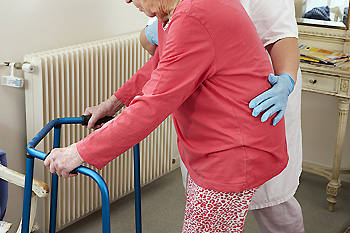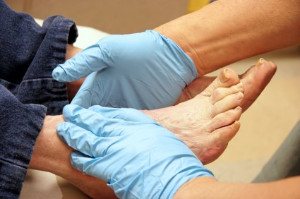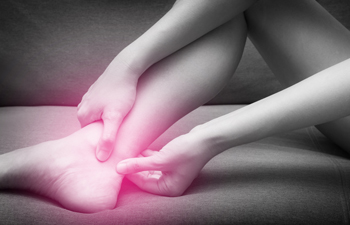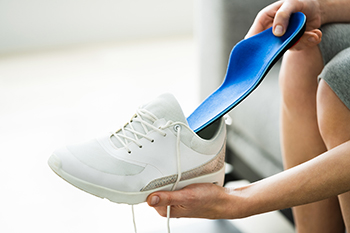Connect With Us
Blog
Items filtered by date: December 2022
Talking About Falls Prevention

The reality of a senior being susceptible to enduring a fall or tumble is serious and nothing to take lightly. Often, as an individual gets older, they might be unwilling to admit the growing likelihood of this kind of occurrence. However, a caretaker or loved one is capable of making a senior aware of this risk by having a simple conversation. Initiating productive conversations with a senior about the reality of enduring a fall can help make the senior more aware of ways to prevent such an injury from happening. For example, having these discussions with seniors can perhaps encourage them to take better care of the health of their feet, making foot care a more important part of their life. After initiating this dialogue with a senior, they also might be more mindful of how they can increase their foot's strength. Contact a podiatrist today if you have any questions or concerns about falls prevention.
Preventing falls among the elderly is very important. If you are older and have fallen or fear that you are prone to falling, consult with Philip K. Schrumpf, DPM from Active Feet Clinic. Our doctor will assess your condition and provide you with quality advice and care.
Every 11 seconds, an elderly American is being treated in an emergency room for a fall related injury. Falls are the leading cause of head and hip injuries for those 65 and older. Due to decreases in strength, balance, senses, and lack of awareness, elderly persons are very susceptible to falling. Thankfully, there are a number of things older persons can do to prevent falls.
How to Prevent Falls
Some effective methods that older persons can do to prevent falls include:
- Enrolling in strength and balance exercise program to increase balance and strength
- Periodically having your sight and hearing checked
- Discuss any medications you have with a doctor to see if it increases the risk of falling
- Clearing the house of falling hazards and installing devices like grab bars and railings
- Utilizing a walker or cane
- Wearing shoes that provide good support and cushioning
- Talking to family members about falling and increasing awareness
Falling can be a traumatic and embarrassing experience for elderly persons; this can make them less willing to leave the house, and less willing to talk to someone about their fears of falling. Doing such things, however, will increase the likelihood of tripping or losing one’s balance. Knowing the causes of falling and how to prevent them is the best way to mitigate the risk of serious injury.
If you have any questions, please feel free to contact our office located in Missoula, MT . We offer the newest diagnostic and treatment technologies for all your foot care needs.
Why Diabetics Have to Care for Their Feet

Individuals who suffer from diabetes often have to take extra special care of different parts of their body. This is because diabetes makes the human body suffer from nerve damage, among many different things. However, nerve damage in the feet is often one of the most serious effects of having diabetes. Due to the nerve damage in the feet, many diabetics might experience some loss of feeling in the feet. As a result, diabetics ought to take extra special care of their feet because this lack of feeling may result in unnoticed afflictions of the foot if not closely monitored. Diabetics can make a point of examining their feet to ensure that they are not missing any signs of a foot condition. For example, performing a simple foot examination can improve the extent to which an individual is monitoring and checking for signs of damage to their feet. If you suffer from diabetes, contact a podiatrist for help today.
Diabetic foot care is important in preventing foot ailments such as ulcers. If you are suffering from diabetes or have any other concerns about your feet, contact Philip K. Schrumpf, DPM from Active Feet Clinic. Our doctor can provide the care you need to keep you pain-free and on your feet.
Diabetic Foot Care
Diabetes affects millions of people every year. The condition can damage blood vessels in many parts of the body, especially the feet. Because of this, taking care of your feet is essential if you have diabetes, and having a podiatrist help monitor your foot health is highly recommended.
The Importance of Caring for Your Feet
- Routinely inspect your feet for bruises or sores.
- Wear socks that fit your feet comfortably.
- Wear comfortable shoes that provide adequate support.
Patients with diabetes should have their doctor monitor their blood levels, as blood sugar levels play such a huge role in diabetic care. Monitoring these levels on a regular basis is highly advised.
It is always best to inform your healthcare professional of any concerns you may have regarding your feet, especially for diabetic patients. Early treatment and routine foot examinations are keys to maintaining proper health, especially because severe complications can arise if proper treatment is not applied.
If you have any questions please feel free to contact our office located in Missoula, MT . We offer the newest diagnostic and treatment technologies for all your foot and ankle needs.
Who Is Prone to Getting an Achilles Tendon Injury?

One of the most painful foot conditions is known as an Achilles tendon injury. It happens when the tendon that is located in the back of the ankle partially or completely tears. This may be more common in middle-aged people. This type of injury can be caused in people who have poor flexibility, or who engage in occasional sporting activities without properly warming up. The symptoms that often accompany an Achilles tendon injury can include hearing a pop at the time of the injury, and the affected foot may be red, swollen, and bruised. Patients have found mild relief when the foot is elevated, and this can help to diminish some of the swelling. The approximate healing time is several weeks, and this depends on how severe the injury is. Additional relief techniques can consist of wearing a boot or cast that can provide stability as the healing process occurs, and specific stretches and exercises are performed. If you have endured this type of injury, please schedule an appointment with a podiatrist who can guide you toward proper treatment methods, which may include surgery in severe cases.
Achilles tendon injuries need immediate attention to avoid future complications. If you have any concerns, contact Philip K. Schrumpf, DPM of Active Feet Clinic. Our doctor can provide the care you need to keep you pain-free and on your feet.
What Is the Achilles Tendon?
The Achilles tendon is a tendon that connects the lower leg muscles and calf to the heel of the foot. It is the strongest tendon in the human body and is essential for making movement possible. Because this tendon is such an integral part of the body, any injuries to it can create immense difficulties and should immediately be presented to a doctor.
What Are the Symptoms of an Achilles Tendon Injury?
There are various types of injuries that can affect the Achilles tendon. The two most common injuries are Achilles tendinitis and ruptures of the tendon.
Achilles Tendinitis Symptoms
- Inflammation
- Dull to severe pain
- Increased blood flow to the tendon
- Thickening of the tendon
Rupture Symptoms
- Extreme pain and swelling in the foot
- Total immobility
Treatment and Prevention
Achilles tendon injuries are diagnosed by a thorough physical evaluation, which can include an MRI. Treatment involves rest, physical therapy, and in some cases, surgery. However, various preventative measures can be taken to avoid these injuries, such as:
- Thorough stretching of the tendon before and after exercise
- Strengthening exercises like calf raises, squats, leg curls, leg extensions, leg raises, lunges, and leg presses
If you have any questions please feel free to contact our office located in Missoula, MT . We offer the newest diagnostic tools and technology to treat your foot and ankle needs.
Orthotics May Benefit Patients Who Have Flat Feet

Orthotics are defined as supportive insoles that provide bone and joint stability, in addition to soft tissue protection. Many patients with flat feet are interested in wearing orthotics, which may relieve this condition. Moving efficiently can be done by having the midfoot flex like a bow while adding shock absorption to the walking style, or gait. There are two types of flat feet consisting of rigid and flexible. Orthotics that have low arches are suggested for people who have rigid flat feet, and flexible feet are indicated when the arch appears while sitting. These individuals may benefit from wearing medium arch orthotics, so it is essential to know which type of flat feet you may have. Additionally, orthotics that have deep heel cups can help to protect the fatty pad that is found under the heel bone. This is generally inadequate in providing heel stabilization. Many people who have flat feet choose to wear orthotics for many reasons, and it is suggested that you confer with a podiatrist if you are interested in pursuing this form of relief.
If you are having discomfort in your feet and would like to try orthotics, contact Philip K. Schrumpf, DPM from Active Feet Clinic. Our doctor can provide the care you need to keep you pain-free and on your feet.
What Are Orthotics?
Orthotics are inserts you can place into your shoes to help with a variety of foot problems such as flat feet or foot pain. Orthotics provide relief and comfort for minor foot and heel pain but can’t correct serious biomechanical problems in your feet.
Over-the-Counter Inserts
Orthotics come in a wide variety of over-the-counter inserts that are used to treat foot pain, heel pain, and minor problems. For example, arch supports can be inserted into your shoes to help correct overarched or flat feet, while gel insoles are often used because they provide comfort and relief from foot and heel pain by alleviating pressure.
Prescription Orthotics
If over-the-counter inserts don’t work for you or if you have a more severe foot concern, it is possible to have your podiatrist prescribe custom orthotics. These high-quality inserts are designed to treat problems such as abnormal motion, plantar fasciitis, and severe forms of heel pain. They can even be used to help patients suffering from diabetes by treating foot ulcers and painful calluses and are usually molded to your feet individually, which allows them to provide full support and comfort.
If you are experiencing minor to severe foot or heel pain, it’s recommended to speak with your podiatrist about the possibilities of using orthotics. A podiatrist can determine which type of orthotic is right for you and allow you to take the first steps towards being pain-free.
If you have any questions please contact our office located in Missoula, MT . We offer the newest diagnostic and treatment technologies for all your foot and ankle needs.
Heel Pain Can Be Treated!
Blog Archives
- August 2024
- July 2024
- June 2024
- May 2024
- April 2024
- March 2024
- February 2024
- January 2024
- December 2023
- November 2023
- October 2023
- September 2023
- August 2023
- July 2023
- June 2023
- May 2023
- April 2023
- March 2023
- February 2023
- January 2023
- December 2022
- November 2022
- October 2022
- September 2022
- August 2022
- July 2022
- June 2022
- May 2022
- April 2022
- March 2022
- February 2022
- January 2022
- December 2021
- November 2021
- October 2021
- September 2021
- August 2021
- July 2021
- June 2021
- May 2021
- April 2021
- March 2021
- February 2021
- January 2021
- December 2020
- November 2020
- October 2020
- September 2020
- August 2020
- July 2020
- June 2020
- May 2020
- April 2020
- March 2020
- February 2020
- January 2020
- December 2019
- November 2019
- October 2019
- September 2019
- August 2019
- July 2019
- June 2019
- May 2019
- April 2019
- March 2019

